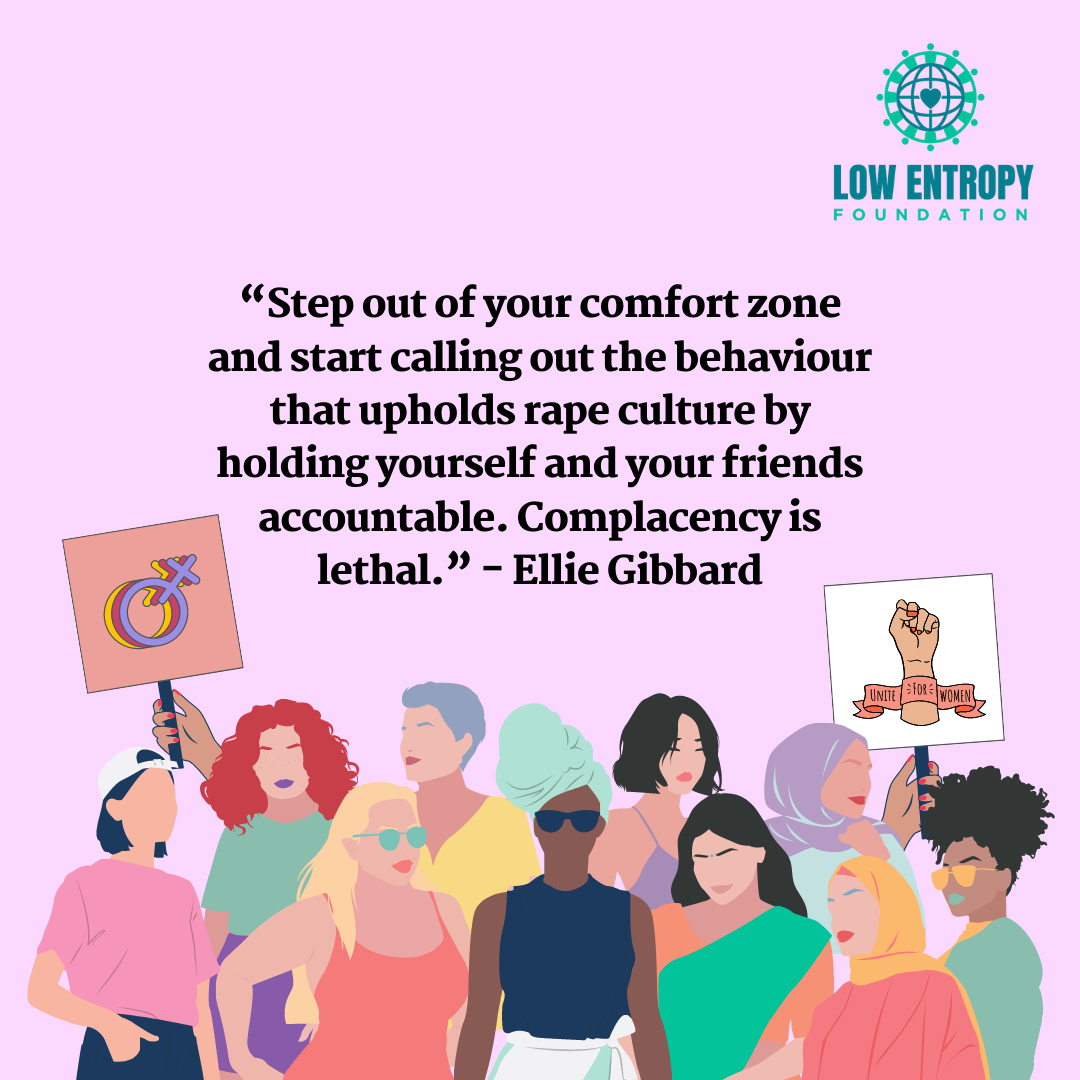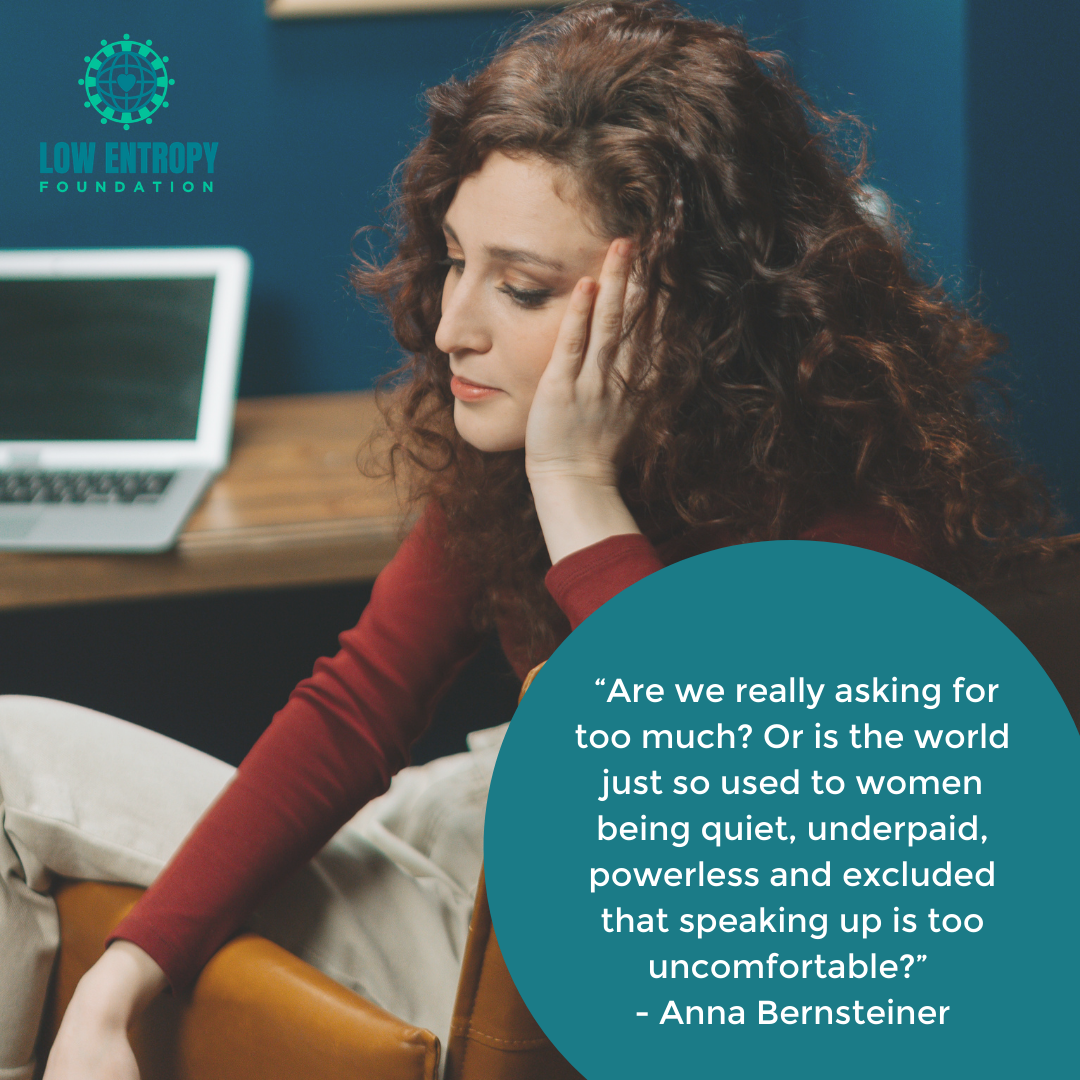Low Entropy Volunteer Writer Ellie Gibbard sends a message to men about accountability and how to be an effective bystander for violence and harassment against women.
Following the tragic death of a young woman in the U.K. by the name of Sarah Everard, the floodgates around women’s rights and safety seemed to fly open. This tragedy, sparking an uncomfortable conversation about the lack of perceived safety women have, forced many to confront their own behaviour and lack of intervention.
As a woman myself, this case and discussion resonated a lot with me. For this blog, I will be speaking on this issue from a white woman’s perspective and my personal experience. It is important to note that, along with women, most visible minorities, including BIPOC, transgender people and others, experience the feeling of unsafety that I will be referencing on a regular basis. The fact that people are walking around feeling afraid to exist because of who they are, how they look or how they identify is a massive issue in the world today. I encourage those who are reading, especially those who have any privilege, to seek further education on these matters and learn how to use their privilege to be an ally for those who may be suffering.
I love being a woman and often find it very empowering. But, with years of being objectified by the media, stereotyped in the professional world and discredited in many other areas of life, being a woman comes with many challenges as well. Concerning my personal safety as a woman, there are several techniques I have learned in order to feel safe in my everyday life. Examples of these could be faking phone calls when I walk anywhere alone, keeping my keys in my hands in case I need to protect myself or constantly showing that I’m alert by keeping my head on a swivel and my hood down. Hearing about the case in the U.K. was especially disheartening because Sarah had practiced what she knew to protect herself: she was walking in broad daylight, wearing bright clothes and was on the phone with her boyfriend. On top of all that, her assailant was a police officer. This devastating case seemed to singlehandedly dismantle the methods I thought I had to stay safe. Hearing about this, along with the fact that one of my best friends – who, growing up, had taught me about consent and how to protect myself – was raped, led me to take bystander intervention training through my university. I will now share some of what I learned, but again, I encourage those who are reading to seek out similar training and resources.
Although I believe that the information that I learned and will discuss today is important for everyone, this information will be directed at men specifically. Despite the comment that “not all men” are responsible for sexual harassment and sexualized violence, when one out of 10 of them are the problem and the other nine do nothing, they are all part of the problem. And maybe “not all men” contribute to the system that enables sexual harassment and violence against women, but 97% of women aged 18-24 have a story. 97%. I hope that percentage grabs your attention like it did mine. This is not the only shocking statistic of its kind, and if you are still struggling to understand the severity of the situation, I encourage you to follow the links posted below this article.
As Brené Brown puts it, “Violence starts with dehumanization. Dehumanization starts with language.” Being accountable starts with language too, and leads me to my first point on being an effective male bystander. Exchanged words and conversations between friends and male counterparts may not be considered harmful if they’re excused as jokes or banter. This is a common oversight, and shutting these comments down is the first step in preventing acts of sexualized violence towards women. If you hear a friend or anyone you know making a “joke” or comment of a violent or misogynistic nature, shut it down. Yes, it will be uncomfortable, and you may get pushback, but this is simply an awkward moment that may save a woman from being in an unsafe situation with this person later. If someone feels reinforcement behind their dehumanizing comments, what will stop them from committing physical acts of dehumanization? Step out of your comfort zone and start calling out the behaviour that upholds rape culture by holding yourself and your friends accountable. Complacency is lethal.
Beyond that, if you are a witness to someone saying things or behaving in violent or misogynistic ways toward another, step in. Acknowledge that what is probably preventing you as a man from intervening is that you are feeling uncomfortable, not unsafe. Use one of the four D’s: Direct, Distract, Delegate, Delay. Being direct means identifying and calling out the inappropriate behaviour or speech, and subsequently de-escalating violent language that could turn physical. Distract the person away from the situation so that the target can safely remove themselves. If for some reason you know with certainty that you are unsafe to personally intervene, delegate the role of intervening to someone who can safely do so. Finally, delay refers to the support you provide to someone who you know has gone through a violent situation and what you do to follow up with them. Offering support to survivors is imperative to changing a system that is set up to silence and invalidate them.
Discussions like this one are just the beginning to what I hope is the turning point for women’s safety and protection against sexualized violence. I can’t place enough emphasis on how important it is to continue educating ourselves: read the statistics, take the training, hold yourself accountable and implement what you learn. My heart goes out to Sarah’s family and her tragic passing will remain with me, as I’m sure it will for many others, for years to come.
https://www.chatelaine.com/living/sarah-everard/
https://canadianwomen.org/the-facts/sexual-assault-harassment/








